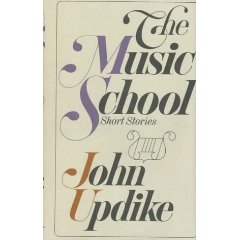John Updike: Excerpts
' Williams swung again, and there it was.'
(from "Hub Fans Bid Kid Adieu," an account of Ted Williams's final game, published 10/22/1959 in The New Yorker)
The afternoon grew so glowering that in the sixth inning the arc lights were turned on—always a wan sight in the daytime, like the burning headlights of a funeral procession. Aided by the gloom, Fisher was slicing through the Sox rookies, and Williams did not come to bat in the seventh. He was second up in the eighth. This was almost certainly his last time to come to the plate in Fenway Park, and instead of merely cheering, as we had at his three previous appearances, we stood, all of us-stood and applauded. Have you ever heard applause in a ballpark? Just applause—no calling, no whistling, just an ocean of handclaps, minute after minute, burst after burst, crowding and running together in continuous succession like the pushes of surf at the edge of the sand. It was a sombre and considered tumult. There was not a boo in it. It seemed to renew itself out of a shifting set of memories as the kid, the Marine, the veteran of feuds and failures and injuries, the friend of children, and the enduring old pro evolved down the bright tunnel of twenty-one summers toward this moment. At last, the umpire signalled for Fisher to pitch; with the other players, he had been frozen in position. Only Williams had moved during the ovation, switching his bat impatiently, ignoring everything except his cherished task. Fisher wound up, and the applause sank into a hush.Understand that we were a crowd of rational people. We knew that a home run cannot be produced at will; the right pitch must be perfectly met and luck must ride with the ball. Three innings before, we had seen a brave effort fail. The air was soggy; the season was exhausted. Nevertheless, there will always lurk, around a corner in a pocket of our knowledge of the odds, an indefensible hope, and this was one of the times, which you now and then find in sports, when a density of expectation hangs in the air and plucks an event out of the future.
Fisher, after his unsettling wait, was wide with the first pitch. He put the second one over, and Williams swung mightily and missed. The crowd grunted, seeing that classic swing, so long and smooth and quick, exposed, naked in its failure. Fisher threw the third time, Williams swung again, and there it was. The ball climbed on a diagonal line into the vast volume of air over center field. From my angle, behind third base, the ball seemed less an object in flight than the tip of a towering, motionless construct, like the Eiffel Tower or the Tappan Zee Bridge. It was in the books while it was still in the sky. Brandt ran back to the deepest corner of the outfield grass; the ball descended beyond his reach and struck in the crotch where the bullpen met the wall, bounced chunkily, and, as far as I could see, vanished.
Like a feather caught in a vortex, Williams ran around the square of bases at the center of our beseeching screaming. He ran as he always ran out home runs-hurriedly, unsmiling, head down, as if our praise were a storm of rain to get out of. He didn't tip his cap. Though we thumped, wept, and chanted "We want Ted" for minutes after he hid in the dugout, he did not come back. Our noise for some seconds passed beyond excitement into a kind of immense open anguish, a wailing, a cry to be saved. But immortality is nontransferable. The papers said that the other players, and even the umpires on the field, begged him to come out and acknowledge us in some way, but he never had and did not now. Gods do not answer letters.
The full account can be read here.
'Sir, you are my God. Except of course for Earl Scruggs.'
"Sir, you are my god," she told me. That's always nice to hear, and she shouldn't have spoiled it by adding, "Except of course for Earl Scruggs. And that nice tall Allen Shelton, who used to fill in on banjo with the Virginia Boys; oh, was cute! Now, have you heard those new sides the McReynoldses have cut down in Jacksonville, with this boy called Bobby Thompson? He is the future! He has this whole new style—you can hear the melody! 'Hard Hearted.' 'Dixie Hoedown.' Oh, my!"
"Young lady, you know, I'm not exactly bluegrass," I told her politely. "Earl, well, he's beginning to miss notes, but you can't get away from him, he's a giant, all right, and Don Reno likewise. Nevertheless, my above-all admiration is Pete Seeger, if you must know. He's the one, him and the Weavers, brought back the five-string after the war, after the dance bands had all but turned the banjo into a ukulele."
"He is folksy and pokey and phony, if you're asking me," she said, with that hurried overemphasis I was beginning to get used to, while her warm black eyes darted back and forth around my face like stirred-up horseflies. "And a traitor to his country besides."
"Well," I admitted, "you won't find him on the Grand Ole Opry real soon, but the college kids eat him up, and he does sheer, sincere picking—none of that show-biz flash that sometimes bothers me about old Earl. Young lady, you should calm yourself and sit down and listen sometime to those albums Pete cut with Woody and the Almanacs before the war."
"I did," she said eagerly. "I did, I did. Talking Union, Sod Buster Ballads. Wonderful true-blue lefty stuff. The West Coast Committee must have loved it. Mr. Chester, did you ever in your life listen to a program called Jamboree out of Wheeling?"
"Did I? I got my first airtime on it, on good old WWVA. Me and Jim Buchanan on fiddle, before he got big. 'Are You Lost in Sin?' and 'Don't Say Good-bye If You Love Me,' with a little 'Somebody Loves You, Darlin'' for a rideout. Did I catch your name, may I ask?"
"You'll laugh. It's a silly name."
"I bet, now, it isn't. You got to love the name the good Lord gave you."
"It wasn't the good Lord, it was my hateful mother," she said and, taking a deep breath that rounded out her cheeks like a trumpet player's, came out with "Imogene." Then she exhaled in a blubbery rush and asked me, "Imogene Frye. Isn't it silly like I said?"
"No," I said. It was my first lie to her. She seemed a little off-center, right from the first, but Imogene could talk banjo, and here in this city of block-long buildings and charcoal suits that was as welcome to me as borscht and salted cucumbers would have been to that homeless KGB colonel, locked out forever as a traitor from the land he loved.
—From the short story "Licks of Love In the Cold War," in the collection, Licks Of Love
'The Blood-Soaked Selfishness Of a Cosmic Mayhem'
Life's sounds all rang with a curious lightness and flatness, as if a resonating base beneath them had been removed. They told Clarence Wilmot what he had long suspected, that the universe was utterly indifferent to his states of mind and as empty of divine content as a corroded kettle. All its metaphysical content had leaked away, but for cruelty and death, which without the hypothesis of a God became unmetaphysical; they became simply facts, which oblivion would in time obliviously erase. Oblivion became a singular comforter. The clifflike riddle of predestination-how can Man have free will without impinging on God's perfect freedom? How can God condemn Man when all actions from alpha and omega are His very own?-simply evaporated; an immense strain of justification was at a blow lifted. The former believer's habitual mental contortions decisively relaxed. And yet the depths of vacancy revealed were appalling. In the purifying sweep of atheism human beings lost all special value. The numb misery of the horse was matched by that of the farmer; the once-green ferny lives crushed into coal's fossiliferous strata were no more anonymous and obliterated than Clarence's own life would soon be, in a wink of earth's tremendous time. Without Biblical blessing the physical universe became sheerly horrible and disgusting. All fleshly acts became vile, rather than merely some. The reality of men slaying lambs and cattle, fish and fowl to sustain their own bodies took on an aspect of grisly comedy-the blood-soaked selfishness of a cosmic mayhem.
—from In The Beauty Of the Lilies'Do You Remember a Fragrance Girls Acquire in Autumn?'
Do you remember a fragrance girls acquire in autumn? As you walk beside them after school, they tighten their arms about their books and bend their heads forward to give a more flattering attention to your words and in the little intimate area thus formed, carved into the clear air by an implicit crescent, there is a complex fragrance woven of tobacco, powder, lipstick, rinsed hair, and that perhaps imaginary and certainly elusive scent that wool, whether in the lapels of a jacket or the nap of a sweater, seems to yield when the cloudless fall sky like the blue bell of a vacuum lifts toward itself the glad exhalations of all things. This fragrance, so faint and flirtatious on those afternoon walks through the dry leaves, would be banked a thousandfold and lie heavy as the perfume of a flower shop on the dark slope of the stadium when, Friday nights, we played football in the city.
—from the short story "In Football Season," published in the 1966 collection, The Music SchoolREQUIEM
It came to me the other day:
Were I to die, no one would say,
"Oh, what a shame! So young, so full
Of promise—depths unplumbable!"
Instead, a shrug and tearless eyes
Will greet my overdue demise;
The wide response will be, I know,
"I thought he died a while ago."
For life's a shabby subterfuge,
And death is real, and dark, and huge.
The shock of it will register
Nowhere but where it will occur.
—John Updike, from his forthcoming collection, Endpoint and Other Poems
THE BLUEGRASS SPECIAL
Founder/Publisher/Editor: David McGee
Contributing Editors: Billy Altman, Derk Richardson
Logo Design: John Mendelsohn (www.johnmendelsohn.com)
Website Design: Kieran McGee (www.kieranmcgee.com)
Staff Photographers: Audrey Harrod (Louisville, KY; www.flickr.com/audreyharrod), Alicia Zappier (New York)
E-mail: thebluegrassspecial@gmail.com
Mailing Address: David McGee, 201 W. 85 St.—5B, New York, NY 10024
Founder/Publisher/Editor: David McGee
Contributing Editors: Billy Altman, Derk Richardson
Logo Design: John Mendelsohn (www.johnmendelsohn.com)
Website Design: Kieran McGee (www.kieranmcgee.com)
Staff Photographers: Audrey Harrod (Louisville, KY; www.flickr.com/audreyharrod), Alicia Zappier (New York)
E-mail: thebluegrassspecial@gmail.com
Mailing Address: David McGee, 201 W. 85 St.—5B, New York, NY 10024


